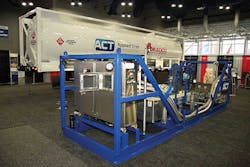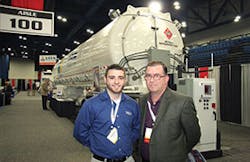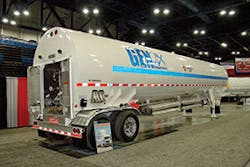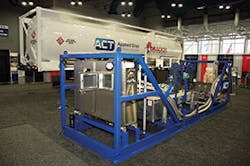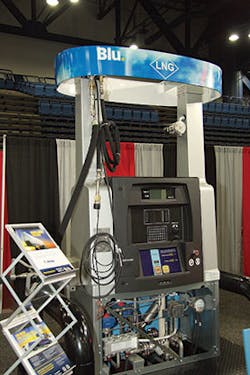Tank fleets see leasing as good way to test natural gas fueled tractors
LEASING offers tank truck fleets and other trucking operations a cost-effective means of learning about natural gas fueled trucks without a large initial investment. Leasing should remain a critical player in the market for quite some time.
Leasing company executives say the big focus right now is on tractors used in local and regional operations. Leasing also is an option, in some cases, for the trailers used to transport liquefied natural gas (LNG) and the portable LNG refueling systems used in the industry.
“We’re seeing a lot more interest in commercial vehicle leasing,” says Scott Perry, vice-president of supply management for Ryder System Inc. “Increasing interest is coming from the bulk transport market, including fuel haulers.
“These companies are looking for an opportunity to lower operating costs. These are high-utilization fleets that run hard and return to base at the end of each driving shift.”
Efficient service
Natural gas-fueled trucks can serve these users very efficiently if the fuel supply is readily available. These companies have learned enough about natural gas as a vehicle fuel that they want to try it, but they want to avoid the cost unknowns. They want consistent monthly payments with no surprises.
The highest demand for natural gas fueled trucks is still on the West Coast, with rapidly growing pockets in Salt lake City, Utah and Denver, Colorado. Demand also is strong in Texas and Louisiana. Other areas with growing interest in natural gas as a truck fuel are in the South East, upper Midwest, Pennsylvania, and upstate New York.
Regardless of location, companies looking at natural gas-fueled vehicles are far more educated today, according to Michelle Harry, director of marketing for PacLease. “Fewer fleet managers are starting from ground zero today,” she says. “We’re quoting for more natural gas trucks now than ever before.”
The typical natural gas leasing customer is likely to be a private fleet operator. “These lessors want to focus on their core business,” Harry says. “They don’t want to worry about specing or maintaining trucks. They just want to serve the needs of their customers.”
Tractor demand
Many of these customers want tractors, and they want them quickly. Daycabs are preferred in most cases. In general, customers are looking for lightweight aerodynamic tractors that can carry just enough fuel to meet the needs of specific operations.
Spark-ignition engines, like the Cummins Westport ISX12 G, are preferred. Automated transmissions were preferred in the past, but increasingly the ISX12 G is being paired with manual transmissions.
“Trucks with the Cummins Westport ISL9 G had to be ordered with an automatic transmission,” Perry says. “We’re still seeing good demand for the automated transmissions, which offer fuel efficiency and help in driver recruiting and retention.”
Probably 80% of the lease customers are selecting tractors configured for compressed natural gas (CNG), according to Perry. Preference is determined by availability, and CNG is more readily available.
“CNG also is less expensive,” Perry says. “LNG has its benefits, though. “Because it is denser, more fuel can be carried in a smaller tank that weighs less than the CNG tanks.”
Future demand
Going forward, leasing demand for natural gas fueled tractors should remain strong in the local and regional vocational markets. The market for natural gas-fueled trucks will be in growth mode for many years to come.
Harry says she believes some vocational fleet customers will stick with leasing for natural gas-fueled tractors for the convenience it offers: The leasing company takes care of the details and the customer just runs the trucks.
Natural gas fueling infrastructure will be critical for the continued growth in the market. Fuel must be available on truck routes. Going out of route to refuel will negatively impact driver hours of service and fleet productivity.”
Lease terms for natural gas trucks are virtually identical to leases for diesel-fueled trucks, and that probably won’t change. Leases are based on mileage and typically don’t exceed 6.5 years.
Realistic resale prices are still to be determined. “We haven’t yet run a full lifecycle with the most recently introduced engines, Perry says. “Residual values are simply unknown at this time. Some early-generation products are just coming up for resale. The market will determine prices based on the value of fuel savings.”
Harry agreed that the natural gas-fueled truck resale market is still developing and added that it will still be a couple of years before the first big groups of leased trucks come in for resale. ♦
